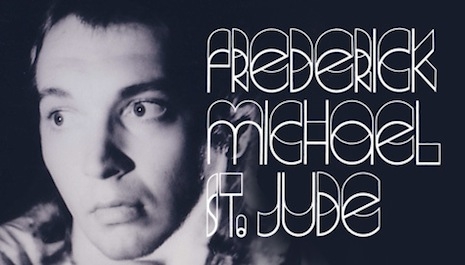
In 1977, a small label out of Ft. Lauderdale, Soul Deep Records, released the debut LP by one Frederick Michael St. Jude. Here Am I was conceived as a commercial album, and though it didn’t make the Billboard charts, as was hoped, it did eventually earn a cult following thanks to St. Jude’s unique take on pop music. His distinctive vocal quiver, reminiscent of Bowie, Ferry, and Jobriath, sits atop a varied set of catchy tunes. Some songs are bleak and futuristic, others show a country influence, while a couple of tracks conjure up the drama found in musical theater.
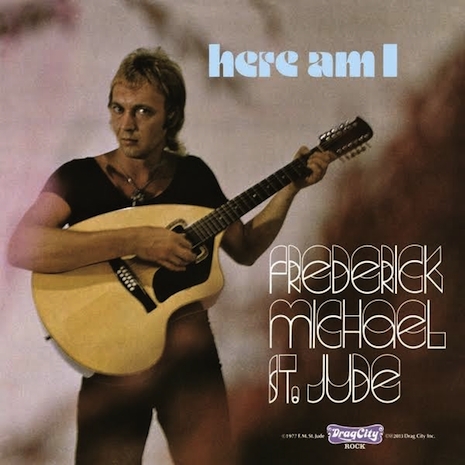
Not long after Here Am I was released, St. Jude visited the office of his label, only to discover Soul Deep had closed its doors and the owners were nowhere to be found. Luckily, St. Jude was able to salvage the Here Am I master tapes, as well as those for his in-progress second album, from the company’s dumpster. Inspired by the circumstances, he set aside the songs he had written for the Here Am I follow-up, and went about composing material for a bold new project, a dystopian rock opera about gangs. Though an album’s worth of material was recorded and an abbreviated version was released on a 1982 EP as Gang War – A Rock Opera, the remainder of the recordings were shelved. Subsequently, St. Jude began pursuing other endeavors, such as magazine publishing and acting, including multiple appearances on a now iconic ‘80s TV show.
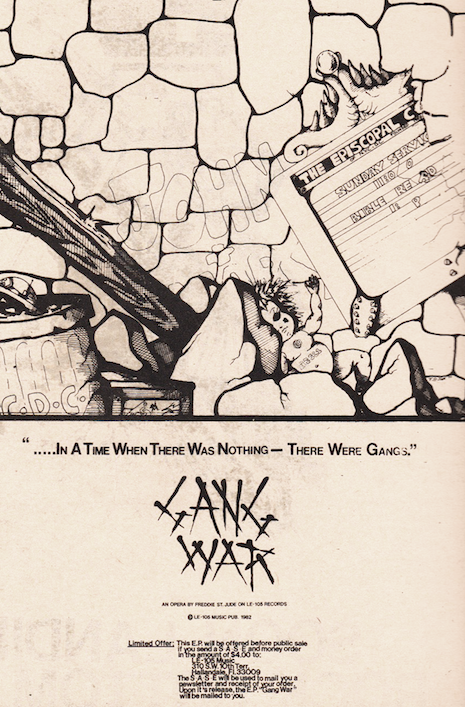
Advertisement for the EP
In 2013, the Chicago-based record label Drag City re-issued Here Am I, and they’re about to unleash Gang War, which means Frederick Michael St. Jude’s rock opera will finally be released in its entirety.
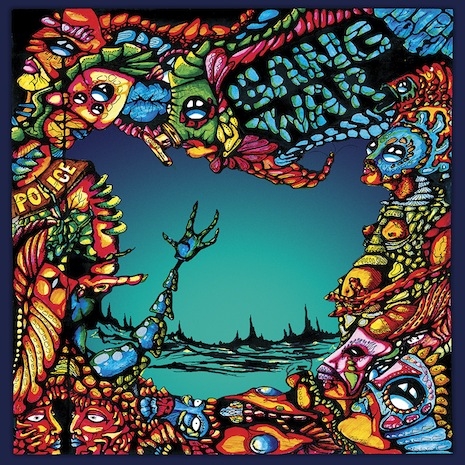
Cover art by Frederick Michael St. Jude
After the introductory, opening theme sets the stage, it quickly becomes apparent that Gang War isn’t exactly about gangs, but is a metaphor for the personal and professional struggles of life. St. Jude incorporated an interesting amalgamation of styles for the album, as the songs bring to mind glam rock titans, Bowie and Bolan; the softer side of Led Zeppelin; the futuristic, dystopian imagery of Gary Numan; and anthemic arena rock by the likes of Styx, Queen, and REO Speedwagon. It’s funky, punky, and rocks with a fist in the air. It’s quite a record.
Here’s our interview with Mr. St. Jude, which was conducted via email.:
What was your creative vision for Gang War?:
Frederick Michael St. Jude: With me, it all begins with strumming chords on the guitar, to be truthful. I had just changed the strings on my Giannini twelve-string and began the initial “break-in”...giving them a stretch, when the series of chords I was playing just sort of clicked. I was overwhelmed with a melody line and the lyrics just came crashing in. We are talking about the main theme song now [“Gang War Theme”]. By the time I was finished, I sat there, stunned. I had been writing songs for years and most came pretty effortlessly, but this…this amazed me. It didn’t take a thud to me head to realize I was onto something important. Especially once I realized it was more than just a song. It was more of a prophecy. From that point on, I was in high gear and the songs just came ripping in. The year was 1982 when this miracle all took place. I say miracle because I am still stunned at how all of it fell into place. I don’t know if Gang War is my “swan song”...I am still writing and recording with my co-producer, Norman Titcomb via computer, but it will certainly do until that “swan song” (if any or another) gets here.
Were any of the songs inspired by your music career?:
FMSJ: Absolutely! Having been a road musician/singer for virtually all of my life, one cannot deny the influence of years of triumph and torment and not have it color the lyrics to one’s compositions. Of course, I really didn’t suffer the majority of, shall we say, influential torment until I started writing my own music and trying to get it picked up by record companies. That’s where most of the “color” comes from. Most of the road bands I was in were not that original. Most were just cover bands. Very frustrating. Of course, in my earlier band days I would admit I wasn’t the most creative person on the planet either. I had the spit and fire but not the “muse.” I expressed myself mostly through art…Painting and such. But I longed to be able to say to our audiences, “Here’s something we have written. Hope you enjoy it.” But…alas…that was not to be as long as I was in a road/cover band. Not holding anything against anyone, nor am I blaming anyone. Most bands do what they do to earn a living and in many cases, support their families. Hours are incredibly long, not to mention living with four or five other guys on the road in mostly crap and cramped conditions. Creativity usually and sometimes MUST take a back seat. So, in order to make up for it, I quit the road nonsense and just started writing. Of course, I had to get a job to support my wife and daughter, so I took a job at a Zayre store as a stock person just to get a paycheck and put food on the table. All the while, I wrote songs. I wrote about broken hearts and crippled situations, stunted relationships, almost-dead dreams and resurrections. That’s where Here Am I came from. Gang War had touches of all the very same influences and drama but dealt mostly with aftermath situations: Rekindling dreams after being rejected by record companies and people in general. It started off to be a massive composition about aftermath and chaos but turned into something that would make a declaration of recovery and wholeness. Truth and stamina. Faith and hope. That’s what Gang War really is: Determination.
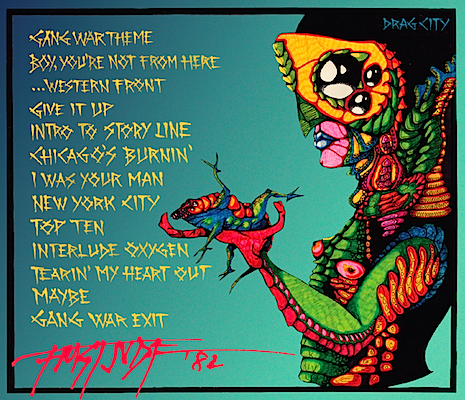
How did you find the musicians that play on the album?:
FMSJ: The guitar player, Joey Crispino, had been in a band with me for a number of years. We met when his band auditioned me for lead singer, and then I drafted him instead to be in my band. He is the single best guitar player I have ever worked with. We got together after all the “road business” was over and done with and we decided we would try it on our own. He said he happened to know a drummer, Gary Redente, who would serve our purpose, and we conscripted him. One day Joey went off to check on some recording studios and get some prices so we could do some recording. I was writing songs like crazy at that time.
He came back with a report about BRT Studios in Ft. Lauderdale and the owner, Norman Titcomb, and said that was the place to begin. Hence we met Norman. God moves in mysterious ways. We did a live recording of “Tearin’ My Heart Out” in one take and I knew the magic was there. We never left that studio. Every song I wrote for Gang War was recorded there. We would lay down the tracks and Norman would add layers. If we needed anyone extra—congas, narrator, whatever…Norman knew the people and he would have them cut tracks. It was a blessed and marvelous time.
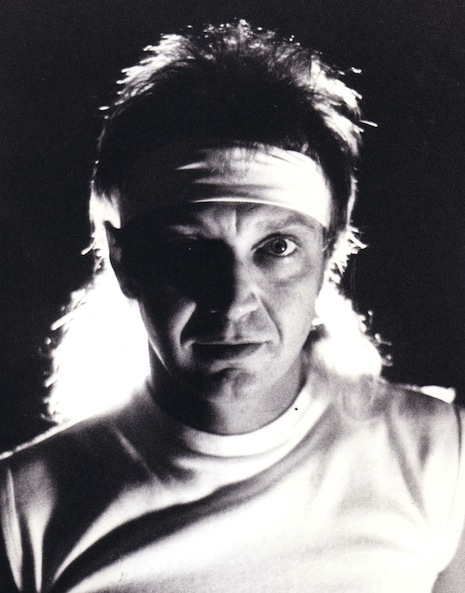
1982
Did any particular band or bands influence the writing of Gang War?:
FMSJ: Not really. I was just utilizing the flows of the time. Hopefully (I would like to think), I was able to incorporate drama, theater, a bit of punk and just good old rock ‘n’ roll.
You’ve said in the past that your vocal style was directly influenced by David Bowie, as well as crooner Anthony Newley, but are you also a fan of the glam rock casualty, Jobriath? I hear a lot of him in your vocals, as well as in the dramatic elements of your music.:
FMSJ: Truth be told, I have never heard Jobriath. I once worked with a bass player that mentioned him but as to actually ever hearing his/their music…no, not at all. As for drama…That might be akin to my writing poetry and plays when I was younger. I appreciate beginnings, middles and ends. Crescendos are mystical, ethereal. I think of everything I do as an expedition, an adventure that must be prepared for yet spontaneous at the same time. I am an actor and I take a stage with abandon. I prefer to interpret the music with my voice, body and eyes and there’s nothing like animation on stage to tell a tale, so…I consider it necessary to incorporate the very same ingredients in my music.
How did you end up appearing on Miami Vice?:
FMSJ: I had been doing live theater for ten years when I decided I would like to go pro. Ada Gordon, one of the elite agents in Miami at the time, decided she would take me on. She said, “He has ‘something.’” The first audition I was called out for was a Vice audition. I auditioned for John Nicolella, he liked what he saw and I got the part in my first Miami Vice episode. Later, Ada sent me on another Vice audition and I got the part playing opposite Sheena Easton. Then, during the final season, my agent called me asked if I wouldn’t do the production company a favor and work in the final episode as a drug dealer. Of course, I said “Yes,” and immediately reported to the Alexander Hotel on South Beach where I met and was thanked by Michael Mann himself for doing the favor. He said he liked my work and appreciated what I was doing for him. However, the director of that episode couldn’t stand me and had me locked in the trunk of the drug dealer’s car five times just to rattle my cage. It was all good, though. I didn’t mind. That’s acting!
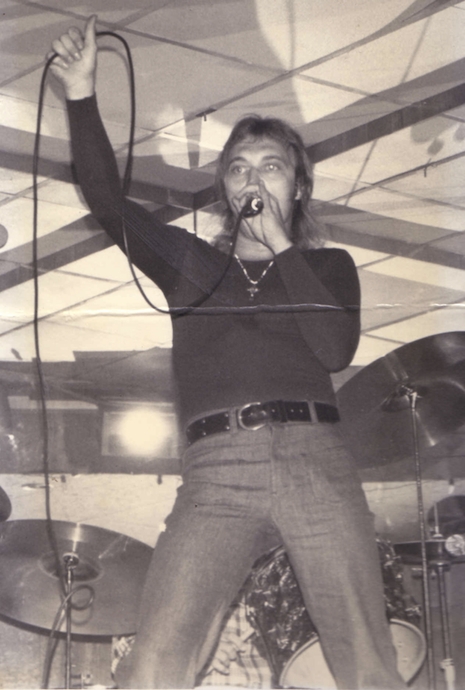
Live, 1976
Any chance you’ll be performing the Gang War material live?:
FMSJ: God willing. All my players are scattered all around. Norman just moved to L.A. We still record via computer as I stated earlier. Joey is in North Miami. I am near Tampa and I have no idea where Gary, the drummer, is, although I believe he became a music attorney (which might come in handy. One never knows). But, yes…It would be quite a show. We shall see what we shall see.
Do you have plans to release new music? On Drag City, perhaps?:
FMSJ: I will get the working master of the second album I recorded to Drag City and see if they are interested. I have also sent a couple of newer tunes that Norman and I have been working on to them just recently. Scott McGaughey [at Drag City] seemed to like the new material. Again…God willing.
And if I can…Allow me to thank Neil Hamburger [a/k/a Gregg Turkington] for hunting me down. This wouldn’t be happening if God didn’t tell him to find me. Many, many thanks to Scott and everyone at Drag City for their faith in my material.
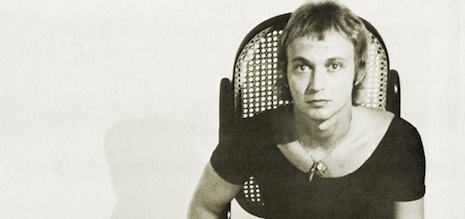
Drag City will release Gang War on March 24th. Pre-order it from the label directly or through Amazon.
Check out one of the stellar tunes from the album, “Boy, You’re Not From Here”: